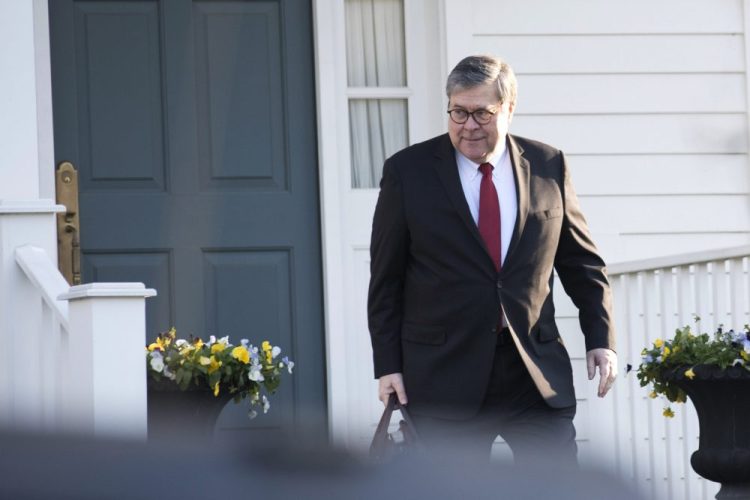Attorney General William Barr’s summary of the Mueller report is scandalous – for reasons that have little to do with “collusion.”
Deputy Attorney General Rod Rosenstein appointed special counsel Robert Mueller nearly two years ago “to ensure a full and thorough investigation of the Russian government’s efforts to interfere in the 2016 presidential election,” as he put it then. Mueller’s report, submitted to the Justice Department last Friday, is titled: “Report on the Investigation into Russian Interference in the 2016 Presidential Election.”
This was supposed to be the last word on Russian interference, a definitive investigation that would show the United States and the world, in detail, how it happened – and, as a subsidiary question, whether Trump campaign officials were involved.
But Barr kissed off the central charge of the investigation with a few paragraphs of summary material already in the public domain. He wrote that the “report outlines the Russian effort to influence the election and documents crimes committed by persons associated with the Russian government in connection with those efforts.” But Barr’s letter provides no such information. If Barr doesn’t give a full public accounting, and soon, he will have squandered Mueller’s heroic efforts and done a disservice to the national interest.
The immediate reaction has been, predictably, a sandbox fight about whether Trump “colluded” with Moscow. “No Collusion, No Obstruction, Complete and Total EXONERATION,” Trump tweeted. That’s false: The probe explicitly didn’t exonerate Trump, and the attorney general’s letter doesn’t mention “collusion,” focusing on the high legal standard of conspiracy and not whether Trump’s campaign sought Russian help, as it clearly did.
But Trump is free to claim vindication. That’s politics. The outrage is Barr has also made this a win for Moscow, which claims vindication despite indisputable Kremlin-committed crimes. That’s unacceptable.
“In short, Russia did not elect Trump,” pro-Putin media personality Evgeny Popov tweeted in response to Barr.
Russian President Vladimir Putin’s spokesman also asserted vindication, falsely stating that “our country has not interfered in the domestic affairs of other countries.”
Alexey Pushkov, a Russian senator, crowed about Barr’s findings, saying, “Democrats will still shout that there was a conspiracy. Conspiracy theory maniacs don’t need facts.”
This is exactly why the world needs Mueller’s facts. How can Barr betray what was always the central purpose of the investigation? I applauded the night Mueller was appointed because while “Democrats were often leaping to conclude that there was high-level collusion … nearly everybody had lost track of the most important issue: Russia, arguably our leading global adversary, had successfully interfered in a U.S. presidential election – undermining confidence in our system of government – and was ready to do it again.”
Barr’s summary – a news release addressed to lawmakers – contained not one full sentence from the Mueller report. Barr seemed determined to exonerate, declaring Trump had not obstructed justice even though Mueller drew no conclusion. Barr’s letter, though saying Mueller found no conspiracy, didn’t address what we colloquially call collusion. As Trump himself helpfully informed us, “collusion is not a crime,” and even his attorney, Rudy Giuliani, claimed he “never said there was no collusion” between Russia and Trump’s campaign. That Mueller found no conspiracy is a relief, sparing us the crisis of having a president who betrayed the country.
Ironically, the probe ended where it began. The pretext for firing James Comey, which set everything in motion, was the then-FBI director declining to charge Hillary Clinton but releasing “derogatory information” about her, detailing how “extremely careless” she was with classified information. Trump now occupies that same netherworld between guilt and innocence: “while this report does not conclude that the President committed a crime, it also does not exonerate him.”
Perhaps congressional investigations and spinoff cases by federal prosecutors in New York and Washington will add clarity. More likely, nobody’s mind will change. Trump will be the same man of dubious integrity he was before Mueller indicted or procured guilty pleas from 34 people, including six prominent Trump advisers.
Even if Barr squelches the report, Mueller’s exercise had some benefit. The lurking prosecutor served as a check on Trump’s excesses at a time before Democrats took control of the House. Mueller made it difficult, for example, for Trump to lift sanctions against Russia.
But now Putin is using Barr’s words to exculpate Russia, even as it prepares to sabotage our 2020 elections. And Trump, who famously can’t “see any reason” to disbelieve Putin, isn’t about to blow the whistle.
Barr owes it to his country to let the world see exactly what Russia did.
Dana Milbank is a columnist for The Washington Post. He can be contacted at: dana.milbank@washpost.com
Send questions/comments to the editors.


